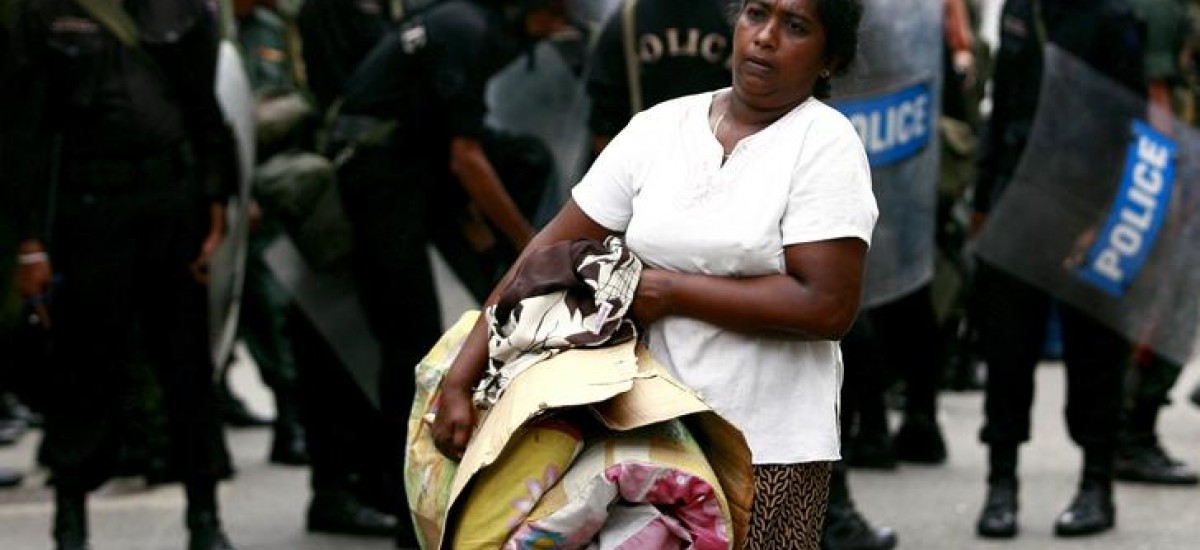Photo courtesy JDS
On 8th May 2010, the Urban Development Authority (UDA) demolished 20 homes that were occupied by 33 families on Mews Street in Kompannyaveediya, Colombo 2. Families were informed verbally a month prior to the demolition that they will have to vacate their homes and served the same in writing only 3 days prior to the demolition. Contrary to the UDA’s claims at that time, the residents of Mews Street were not illegal occupants of state land but had deeds to the land but at no point was the Land Acquisition Act followed. Their homes eventually made way for the expansion of the school for children of military officers.
Soon after demolition of Mews Street, a spokesperson for the UDA was reported as saying,
“There are many types of deeds. If they have the proper deeds, they can produce them. This is state land and these are unauthorised structures on state land,” he claimed. He accepted that the residents have the right to go to courts but insisted that that would not hinder the relocation programme. “They have the right to go to courts. That won’t slow down the process, it would only speed it up.”
Residents were not given any information regarding alternative accommodation or compensation. Thus when the UDA authorities arrived with bulldozers accompanied by armed soldiers, residents resisted but in vain. The eviction took place in broad daylight, with hundreds of army and police personnel present to keep the media away. One of the few videos of that afternoon shows the despair and destruction experienced by the families. Some families did not even have enough time to gather documents like birth certificates, marriage certificates or even children’s school books.
Residents were left destitute, with many of their belongings destroyed, and for 3-4 days were housed and provided daily meals at the mosque by the Federation of Kompannaveediya Masjids, until they found alternative accommodation with relatives or elsewhere.
None of them were compensated for the loss of their homes, possession or businesses. They were offered alternative housing in a temporary resettlement scheme in Thotalanga—“rows of single-room wooden shelters” that reminded two commentators of “Zone 1 in Menik Farm”—but promised permanent housing in a newly built apartment complex in Dematagoda in one year’s time. Subsequently, the evicted residents were also offered a rental allowance to enable them to live elsewhere.
A Fundamental Rights petition was filed in the Supreme Court and on 24th of June 2010, they were granted leave to proceed and the UDA and the Court gave assurances that permanent alternative housing would be given to those evicted. However when former President Mahinda Rajapaksa formally opened the new resettlement complex, called Mihindu Senpura, in Dematagoda, on 18th November 2013, none of the Mews Street evictees were allotted any of the 500 apartments, which were distributed amongst those evicted from elsewhere in the city.
Today marks five years since their eviction. The 33 families are still living on rent, and rent money is given to them every six months by the UDA, something that has been a constant inconvenience and cause of tenure insecurity. They have also been struck off the voter registry and disenfranchised since their eviction.
In April 2014, in a report on evictions in Colombo, the Centre for Policy Alternatives stated that “The Mews Street case highlights the arbitrariness at work as well as the utter disregard on part of the UDA and the Government of Sri Lanka for the continuous and cumulative losses and damages suffered by evicted communities.”
Almost four months into the new Government under President Maithripala Sirisena, Mews Street residents are yet to get any indication of when they will be given housing. Community members and civil society have held meetings with Rauf Hakeem, the new Minister for urban development, who has been aware of the case since the day of eviction but no solid assurances have been extended to the families yet. At the previous hearing of their case, the residents were told that would be given housing in a new housing scheme being built in Maligawatte. They do not know how big the apartments are, whether or not they will have to pay for it, when the building will be developing and when they will be able to move in.
Until then, they continue to live their lives in limbo in rented homes away from Colombo, hoping that one day they will get to be home owners like they once were.
The author is a Senior Researcher at the Centre for Policy Alternatives. For more information on evictions in Colombo, read ‘Forced Evictions in Colombo – The Ugly Price of Beautification’.

